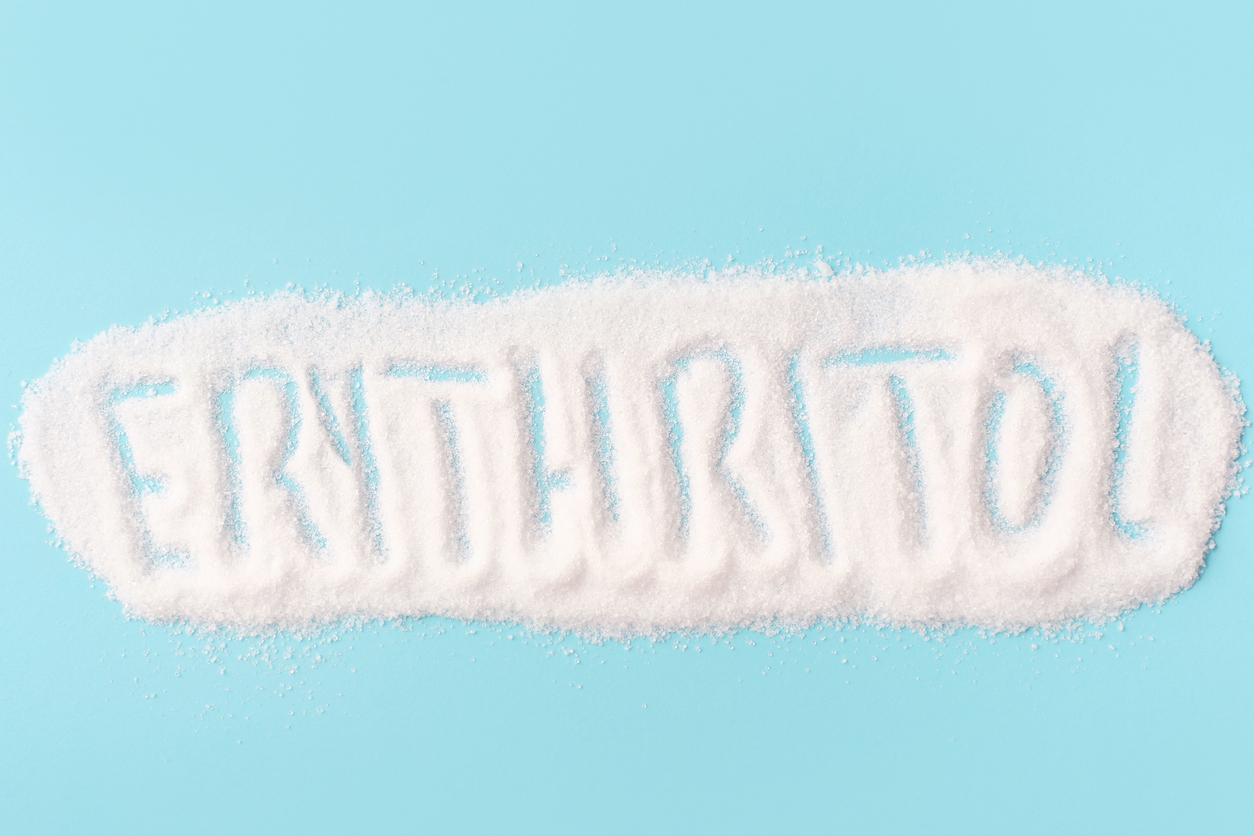

Background on Erythritol
Erythritol is one of the most common artificial sweeteners around. Known as a “sugar alcohol,” however it is not actually a sugar or alcohol and this can impact the human body. It’s a popular ingredient in foods marketed for weight loss and diabetes management. Unfortunately, a growing body of evidence is linking erythritol to major health events including heart attack and ischemic stroke events.
Natural Erythritol vs. Chemical Erythritol
Like other sugar alcohols, erythritol is made by our own bodies as a part of metabolism, however at very low levels. The naturally occurring production of erythritol isn’t the problem, but when chemically produced erythritol is used in high doses to sweeten packaged “diet” foods is where the adverse effects start. Chemically engineered erythritol is manufactured through fermented corn. Large corporations such as the Mitsubishi Chemical Group Corporation are just one of the many manufacturers.
Why May Erythritol Not Be Safe?
The Food and Drug Administration labels erythritol as “generally recognized as safe,” meaning no long-term safety studies on its effects are required for its use. However, this may change in the near future as it has with asbestos, cigarettes, RoundUp, and talcum powder which were used for dozens of years before their true danger were understood.
Those who ingest a considerable amount of chemically manufactured Erythritol, either through the use of products like Truvia & Splenda Naturals Stevia may be putting their body’s microbiome at risk. In plain terms, introducing the chemical into the human body in significant quantities is the problem, even for those who may be obese, have diabetes, or other metabolic syndromes to help manage their sugar or calorie intake.
Scientific studies link cardiac events like heart attacks and ischemic stroke as the most common medical condition considering a study of 4,000 erythritol users.
In March 2023, Dr. Stanley Hazen, a medical doctor at the Cleveland Clinic, and specialist in preventative cardiovascular medicine and the senior author of the study stated the following:
“The very people who are being targeted for foods that contain erythritol are the same people who already are at increased risk for cardiovascular events, so this is very concerning.” He went on to say, “We were looking for compounds in blood that predict risk for experiencing a future heart attack or stroke. The top candidate that kept showing up was erythritol.”
Where is Erythritol Made?
Like many food supplements, erythritol is big business and often manufactured overseas in countries like China to save on costs, and then bought in bulk by suppliers in the United States to be added to packaged foods commonly marketed as “sugar-free” or “low calorie.”
Can I File an Erythritol Lawsuit?
Yes. However, before any lawsuits will be filed our firm is currently in the “investigation” stage trying to determine commonalities that support the medical findings of cardiac events. We are investigating to learn more about the types of products and your individual consumption of these products.
Our firm conducts this investigation as we intend to lead the litigation in a swift and efficient manner as filing lawsuits against billion-dollar overseas corporations requires considerable time and financial resources. Fortunately for you, our firm fronts all costs in what is known as a “contingency fee” arrangement, so there is no out-of-pocket cost to you.
What Are 3 Benefits of Filing an Erythritol Lawsuit?
- Filing a lawsuit helps to draw attention to the marketplace and encourages further scientific research and awareness, and supports the law firm in forcing the erythritol manufacturers to turn over internal documents that may not be available to the public.
- A large financial award may be recovered and this can be used to help pay for advanced medical treatments, improve the quality and enjoyment of life, or leave a legacy for a family in the event you have lost a loved one due to the use of erythritol.
- One of the most important benefits is changing an industry that is chemically manufacturing harmful food products that are leading to disease and death, and doing so under the veil of providing a “healthy alternative.” Should the growing body of scientific evidence support that erythritol presents far more dangers than benefits, this change will protect future generations.
Who Would be My Erythritol Lawyer?
 Founding partner, Ted Oshman, has nearly 40 years of experience representing individuals and their families in all 50 states. He has had protected the rights of Americans in cases ranging from birth injuries, food supplements, toxic baby food, and other chemical substances which have been known to cause harm.
Founding partner, Ted Oshman, has nearly 40 years of experience representing individuals and their families in all 50 states. He has had protected the rights of Americans in cases ranging from birth injuries, food supplements, toxic baby food, and other chemical substances which have been known to cause harm.
We have litigated against many of the largest domestic and overseas corporations including Monsanto, Glaxo Smith Kline, Takeda, and Purdue Pharma, the now defunct creators of the opioid epidemic.
What Would Be Expected When Filing an Erythritol Lawsuit?
It’s a fairly simple process at this stage. You can simply contact our office at 800-400-8182 and answer questions from one of our intake professionals. They will gather this information to be presented to the lawyers working on your case, which is likely to include health and dietary information. Please be honest, including if there is a history of smoking as this helps us to better understand and strategize your case for the best possible result.
How Long Will an Erythritol Lawsuit Take to Resolve?
It could take 2-3 years or more and varies on numerous factors yet to be understood. However, please keep in mind it is our goal to resolve your case quickly and avoid any interruption in your day-to-day life. We know that a quick resolution will help to put this matter behind you so you can begin to enjoy the benefits of a lawsuit’s recovery.
Remember, all consultations are free, confidential, and there is no obligation; simply get your questions answered reliably! Contact us today using the webform on this page or by calling 800-400-8182.
Sources:
https://health.clevelandclinic.org/erythritol/
https://www.nature.com/articles/s41591-023-02223-9.epdf
